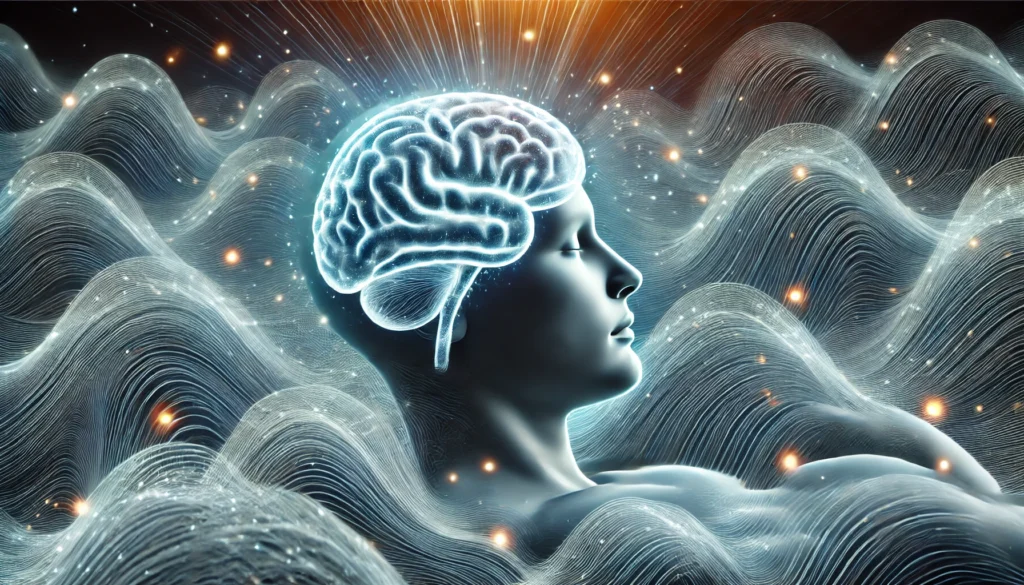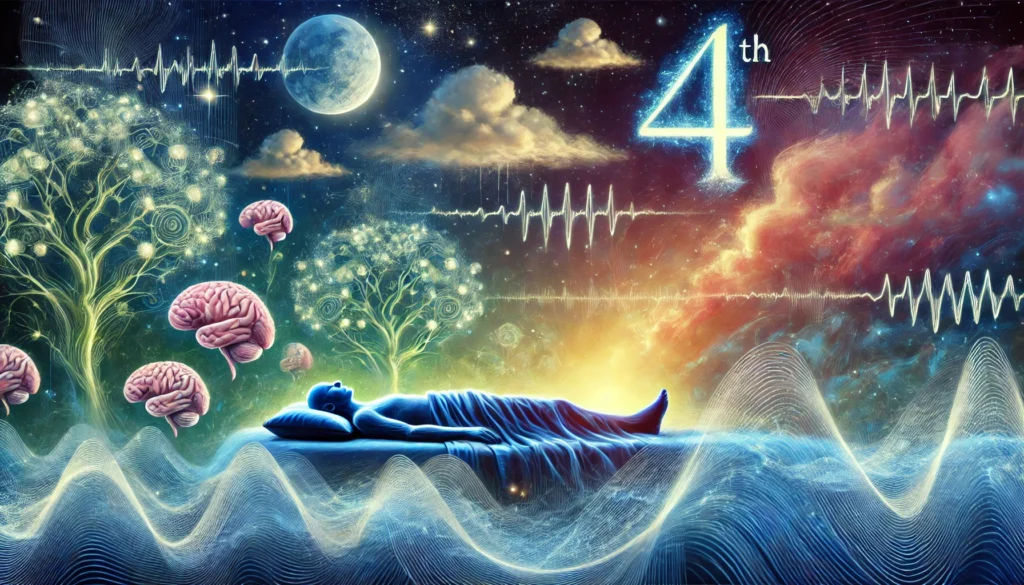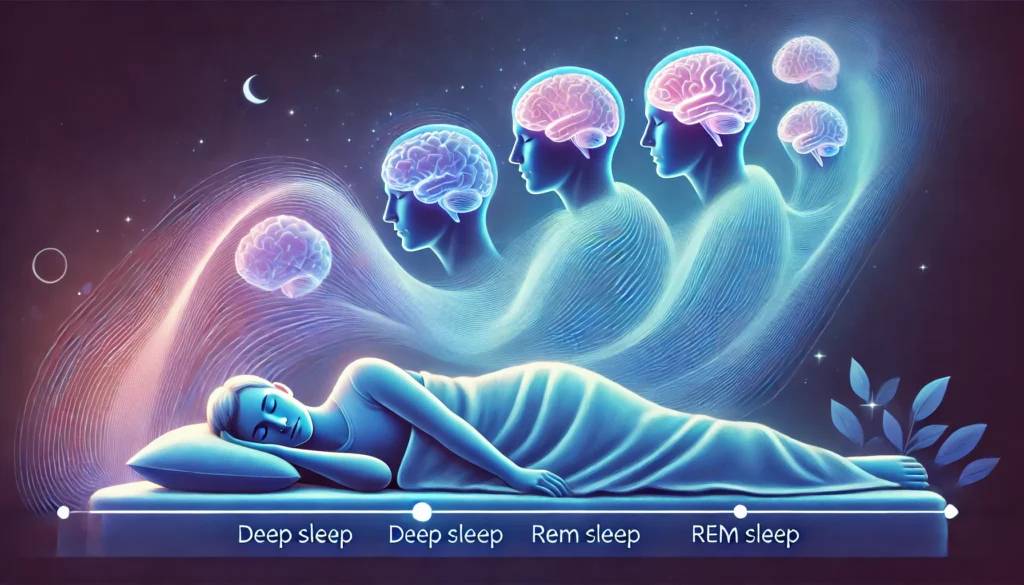Sleep is one of the most vital functions of the human body, yet its intricacies remain a mystery to many. It is during sleep that our brains and bodies undergo crucial restorative processes, ensuring optimal health, cognitive function, and longevity. Understanding the human sleep cycle, particularly the four stages of sleep, provides critical insight into how sleep affects the brain, why deep sleeping is essential, and how it contributes to anti-aging and overall well-being. This article delves into the significance of sleep cycles, why they matter, and how achieving sufficient deep sleep can enhance brain health and longevity.
You may also like : Best Things for Brain Health: Expert-Backed Strategies to Keep Your Mind Sharp
Understanding the Human Sleep Cycle
The human sleep cycle is divided into four distinct stages, each serving a unique function in brain and body restoration. These stages cycle multiple times throughout the night, ensuring a complete and balanced sleep experience. The four stages include three non-REM (NREM) stages and one REM (Rapid Eye Movement) stage. Each cycle typically lasts around 90 minutes, repeating about four to six times per night. A normal sleep pattern involves a gradual progression through these stages, which play an integral role in maintaining memory, cognition, and overall well-being.
Stage 1: Light Sleep and Transitioning to Deep Sleep
The first stage of sleep, known as NREM Stage 1, is the lightest phase. It serves as the transition from wakefulness to sleep, lasting only a few minutes. During this stage, brain wave activity begins to slow down, muscles relax, and breathing becomes more regular. While many people may experience sudden muscle jerks or sensations of falling during this stage, it is a crucial entry point into the deeper stages of sleep.
Although this stage is brief, it plays a crucial role in preparing the body for the upcoming sleep cycles. Without smoothly transitioning through Stage 1, the body may struggle to reach deeper sleep stages, leading to fragmented sleep. Since deep sleeping is essential for brain health, ensuring smooth progression through Stage 1 is the first step toward achieving high-quality rest.

Stage 2: The Onset of Sustained Sleep
Stage 2 of sleep is characterized by a further decline in heart rate and body temperature as the body prepares for deep sleep. This stage lasts longer than Stage 1 and is marked by the presence of sleep spindles—bursts of brain activity that help protect sleep from disturbances. The role of Stage 2 is to consolidate memories and process information collected throughout the day, making it essential for cognitive function and learning.
People often underestimate the importance of this stage, assuming that only deep sleep matters. However, Stage 2 serves as a bridge between light sleep and the 4th stage of sleep, ensuring that individuals can enter and maintain restorative sleep phases. Given that deep sleeping is essential for brain health, optimizing this stage through proper sleep hygiene can significantly impact overall well-being.
Stage 3: Deep Sleep and Its Benefits
NREM Stage 3, often referred to as deep sleep or slow-wave sleep (SWS), is the most restorative phase of sleep. It is during this stage that the body undergoes physical repair, tissue growth, and immune system strengthening. Brain waves slow dramatically, and the body enters a state of deep relaxation. Deep sleep is crucial for cognitive enhancement, memory consolidation, and emotional regulation.
One of the most frequently asked questions regarding sleep is: is deep sleep better than REM sleep? While both deep sleep and REM sleep serve essential functions, deep sleep is particularly vital for cellular repair and brain detoxification. This stage also plays a role in reducing inflammation, supporting cardiovascular health, and enhancing longevity. Given its numerous health benefits, ensuring an adequate amount of deep sleep is critical for maintaining optimal brain function and preventing cognitive decline.
Stage 4: REM Sleep and Its Role in Brain Health
The fourth stage of sleep, REM sleep, is often associated with vivid dreaming and heightened brain activity. During REM sleep, the brain becomes more active, processing emotions, consolidating memories, and promoting creativity. This stage is essential for cognitive flexibility and emotional well-being. However, a common concern arises: does more REM sleep mean overworked?
While excessive REM sleep may indicate stress or disrupted sleep cycles, a balanced amount of REM sleep is beneficial. It supports neuroplasticity, which is the brain’s ability to adapt and form new connections. However, too little or too much REM sleep can lead to mood disturbances, memory issues, and decreased cognitive performance.
When evaluating what is the best sleep stage, it becomes clear that no single stage is superior. Instead, a balanced sleep cycle, incorporating adequate amounts of deep sleep and REM sleep, is key to brain health and longevity.

How Important Is Deep Sleep for Longevity?
As individuals age, the quality and quantity of deep sleep often decline. This reduction in deep sleep is associated with cognitive decline, increased inflammation, and a higher risk of neurodegenerative diseases such as Alzheimer’s. Understanding what causes deep sleep can help individuals take proactive measures to enhance sleep quality. Factors such as maintaining a consistent sleep schedule, avoiding caffeine before bedtime, and engaging in relaxation techniques can all contribute to deeper sleep.
Studies have demonstrated that deep sleep is crucial for cellular repair and anti-aging. By reducing stress, improving cardiovascular health, and enhancing immune function, deep sleep serves as a natural anti-aging mechanism. It is a critical component of a normal sleep pattern that supports overall health and longevity.
Frequently Asked Questions (FAQ) About Sleep Cycles and Deep Sleeping
1. What is the best type of sleep for brain health and longevity?
The best type of sleep is one that follows a normal sleep pattern, ensuring a full cycle of all four stages of sleep. While each stage plays a critical role, deep sleeping is particularly important for brain detoxification, memory consolidation, and cell repair. Studies suggest that people who consistently experience quality deep sleep have lower risks of neurodegenerative diseases and improved cognitive function. However, REM sleep benefits emotional regulation and problem-solving skills, making it equally essential. Ultimately, a balanced human sleep cycle that includes adequate deep sleep and REM sleep is the key to longevity and optimal brain health.
2. Why do sleep cycles matter for cognitive function?
Understanding sleep cycles—why they function the way they do—can help people optimize their mental performance and well-being. The human sleep cycle consists of light sleep, deep sleep, and REM sleep, each contributing to different cognitive processes. Deep sleeping is essential for consolidating new memories, while REM sleep is crucial for emotional processing and creative thinking. Interruptions to the sleep cycle can lead to brain fog, decreased problem-solving abilities, and even long-term cognitive decline. Maintaining a structured sleep schedule ensures that all sleep stages are completed multiple times each night, supporting overall brain function.
3. What happens during the core sleep stages?
Core sleep includes deep sleep and REM sleep, which are the two most restorative parts of the sleep cycle. During core sleep, the body undergoes physical and cognitive repairs, with deep sleep facilitating muscle growth and immune function while REM sleep benefits emotional regulation and learning. What happens during core sleep is crucial to overall well-being, as disruptions can result in fatigue, poor memory retention, and weakened immunity. Many people underestimate the importance of maintaining a full sleep cycle, but prioritizing sleep quality can significantly enhance longevity and mental performance. Ensuring adequate core sleep also supports metabolic health, reducing the risk of obesity and cardiovascular disease.
4. Does more REM sleep mean overworked brain activity?
Excessive REM sleep can indicate stress, anxiety, or irregular sleep patterns, but it does not necessarily mean the brain is overworked. REM sleep is better than deep sleep in terms of emotional processing and dreaming, but deep sleep is better than REM when it comes to physical restoration. If someone experiences prolonged REM sleep while feeling fatigued during the day, it may indicate that deep sleep is insufficient. Balancing the sleep cycle by maintaining a consistent bedtime and minimizing blue light exposure can help regulate REM sleep duration. A proper balance between REM and deep sleep ensures optimal cognitive function without overburdening the brain.
5. What causes deep sleep to decline with age?
Several factors contribute to a decline in deep sleep as people age, including hormonal changes, increased stress levels, and lifestyle habits. Melatonin production decreases over time, making it harder to enter the 4th stage of sleep, where deep restoration occurs. Additionally, medical conditions such as sleep apnea and restless leg syndrome can disrupt deep sleeping patterns. While aging naturally reduces deep sleep duration, maintaining a healthy lifestyle, regular exercise, and a comfortable sleep environment can counteract these effects. Understanding how important deep sleep is for long-term health can motivate individuals to adopt habits that improve their sleep quality.
6. Is deep sleep good for muscle recovery and overall physical health?
Yes, deep sleep is essential for muscle recovery and overall physical health. During the 4th stage of sleep, the body releases growth hormones that aid in tissue repair and muscle rebuilding. Athletes and individuals with physically demanding lifestyles benefit significantly from deep sleeping, as it reduces inflammation and accelerates recovery. Additionally, deep sleep supports cardiovascular health by lowering blood pressure and regulating blood sugar levels. Prioritizing deep sleep by maintaining a proper sleep schedule and reducing nighttime stress can lead to improved physical performance and longevity.
7. How can someone improve their normal sleep pattern for better deep sleep?
To improve a normal sleep pattern and achieve more deep sleep, it is important to maintain a consistent bedtime, create a dark and quiet sleep environment, and avoid caffeine or heavy meals before bed. Regular physical activity during the day can also increase the body’s need for deep sleep. Practicing relaxation techniques such as meditation or deep breathing can reduce stress and help the brain transition into the 4th stage of sleep more effectively. Limiting screen time before bedtime prevents disruptions in melatonin production, further enhancing deep sleep quality. By implementing these habits, individuals can naturally enhance their human sleep cycle and reap the benefits of deep sleep.
8. What does deep sleep do for memory and learning?
Deep sleep plays a fundamental role in memory consolidation and learning by transferring short-term memories to long-term storage in the brain. Without adequate deep sleep, individuals may experience difficulty retaining new information, impaired problem-solving skills, and increased forgetfulness. The benefits of deep sleep extend to academic performance, workplace productivity, and overall cognitive resilience. Research shows that students and professionals who prioritize deep sleep perform better on tests and complex tasks. Understanding the relationship between sleep and memory can help individuals make sleep a priority to enhance mental sharpness and learning potential.
9. Is deep sleep better than REM for stress reduction?
Both deep sleep and REM sleep contribute to stress reduction, but they do so in different ways. Deep sleep is better than REM for physical relaxation, lowering stress hormone levels, and repairing the body. On the other hand, REM sleep benefits emotional processing and resilience by allowing the brain to work through daily stressors in a dream-like state. If a person lacks deep sleep, they may experience heightened physical tension and fatigue, whereas insufficient REM sleep can result in mood swings and emotional distress. A balanced sleep cycle ensures that both deep and REM sleep work together to reduce stress and improve overall well-being.
10. Why do I sleep so deeply some nights and lightly on others?
The depth of sleep varies depending on factors such as physical exertion, stress levels, diet, and sleep schedule consistency. Some nights, the body may require more recovery, leading to prolonged deep sleeping. On other nights, external disruptions such as noise, temperature fluctuations, or anxiety can prevent the body from reaching the 4th stage of sleep. Consuming alcohol or caffeine close to bedtime can also alter sleep depth, making it difficult to sustain deep sleep. To achieve a more consistent sleep experience, it is essential to establish a sleep-friendly environment and follow a stable routine that supports a healthy human sleep cycle.

Conclusion: Prioritizing Sleep for Brain Health and Anti-Aging
Achieving high-quality sleep is fundamental to cognitive enhancement, memory consolidation, and longevity. Each of the four stages of sleep plays a distinct role in maintaining brain health, with deep sleep being particularly vital for physical restoration and cognitive function. The relationship between deep sleep and REM sleep highlights the importance of a balanced sleep cycle rather than prioritizing one stage over another.
By understanding why deep sleeping is essential and taking proactive steps to improve sleep quality, individuals can enhance their brain function, reduce the risk of neurodegenerative diseases, and promote longevity. Sleep is not merely a passive state—it is an active process that rejuvenates the body and mind, ensuring a healthier, longer life.
sleep quality improvement, restorative sleep benefits, healthy sleep habits, deep sleep cycles, optimizing sleep patterns, non-REM vs REM sleep, circadian rhythm regulation, sleep deprivation effects, brain detoxification during sleep, melatonin and deep sleep, sleep hygiene techniques, cognitive function and sleep, sleep disorder prevention, natural ways to improve sleep, stress management for better sleep, sleep and longevity connection, neuroplasticity and sleep, aging and sleep quality, sleep tracking insights, best practices for restful sleep
Further Reading:
Sleep Stages: Understanding the Sleep Cycle
Sleep stages: what are they and why are they important?
Sleep cycle stages and their effect on the body
Disclaimer
The information contained in this article is provided for general informational purposes only and is not intended to serve as medical, legal, or professional advice. While Health11News strives to present accurate, up-to-date, and reliable content, no warranty or guarantee, expressed or implied, is made regarding the completeness, accuracy, or adequacy of the information provided. Readers are strongly advised to seek the guidance of a qualified healthcare provider or other relevant professionals before acting on any information contained in this article. Health11News, its authors, editors, and contributors expressly disclaim any liability for any damages, losses, or consequences arising directly or indirectly from the use, interpretation, or reliance on any information presented herein. The views and opinions expressed in this article are those of the author(s) and do not necessarily reflect the official policies or positions of Health11News


